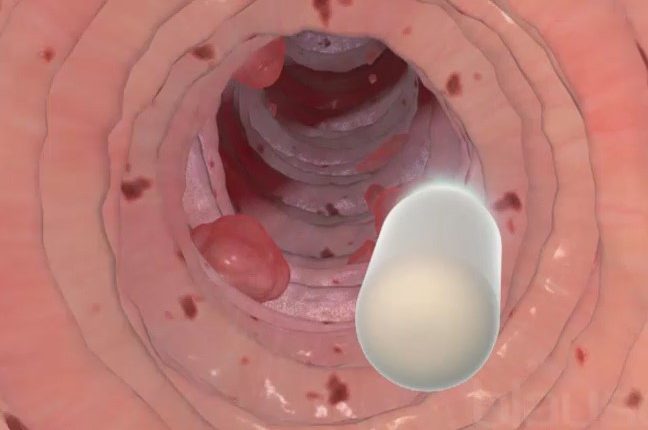
Capsule endoscopy: what it is and how it is performed
Capsule endoscopy is a diagnostic test that is mainly used for the analysis of diseases of the small intestine.
When to perform capsule endoscopy
Capsule endoscopy is used in cases of gastrointestinal bleeding of unknown origin (i.e. in those cases in which gastroscopy and colonoscopy have already given a negative result), coeliac disease, Crohn’s disease, sideropenic anomie and tumour pathologies.
How capsule endoscopy is performed
Capsule endoscopy is performed using a small capsule (about the size of a normal tablet) that mounts a microvideo camera: the capsule is swallowed by the patient, travels through the gastroinestinal tract recording and transmitting the images to an external recorder (placed in a belt worn by the patient); the recorder then transmits the images received to a computer, which processes them and produces a complete video of the capsule’s journey.
The capsule is then expelled with the faeces and is not reusable.
How to prepare for capsule endoscopy
Before undergoing capsule endoscopy, the patient must perform an intestinal cleanse and have been fasting for at least 12 hours.
The test is uncomfortable and lasts on average 8 hours, during which the patient can continue his or her daily activities (after 4 hours he or she can also have a snack).
Hospitalisation is therefore not necessary.
Read Also
Emergency Live Even More…Live: Download The New Free App Of Your Newspaper For IOS And Android
Gastroscopy: What The Examination Is For And How It Is Performed
Gastro-Oesophageal Reflux: Symptoms, Diagnosis And Treatment
Endoscopic Polypectomy: What It Is, When It Is Performed
Straight Leg Raise: The New Manoeuvre To Diagnose Gastro-Oesophageal Reflux Disease
Gastroenterology: Endoscopic Treatment For Gastro-Oesophageal Reflux
Oesophagitis: Symptoms, Diagnosis And Treatment
Gastro-Oesophageal Reflux: Causes And Remedies
Gastroscopy: What It Is And What It Is For
Short Bowel Syndrome: Causes, Therapy, Diet
Vomiting Blood: Haemorrhaging Of The Upper Gastrointestinal Tract
Pinworms Infestation: How To Treat A Paediatric Patient With Enterobiasis (Oxyuriasis)
Intestinal Infections: How Is Dientamoeba Fragilis Infection Contracted?
Gastrointestinal Disorders Caused By NSAIDs: What They Are, What Problems They Cause
Intestinal Polyps: Diagnosis And Types
Differences Between Mechanical And Paralytic Ileus: Causes, Symptoms And Treatment
Endoscopic Polypectomy: What It Is, When It Is Performed



